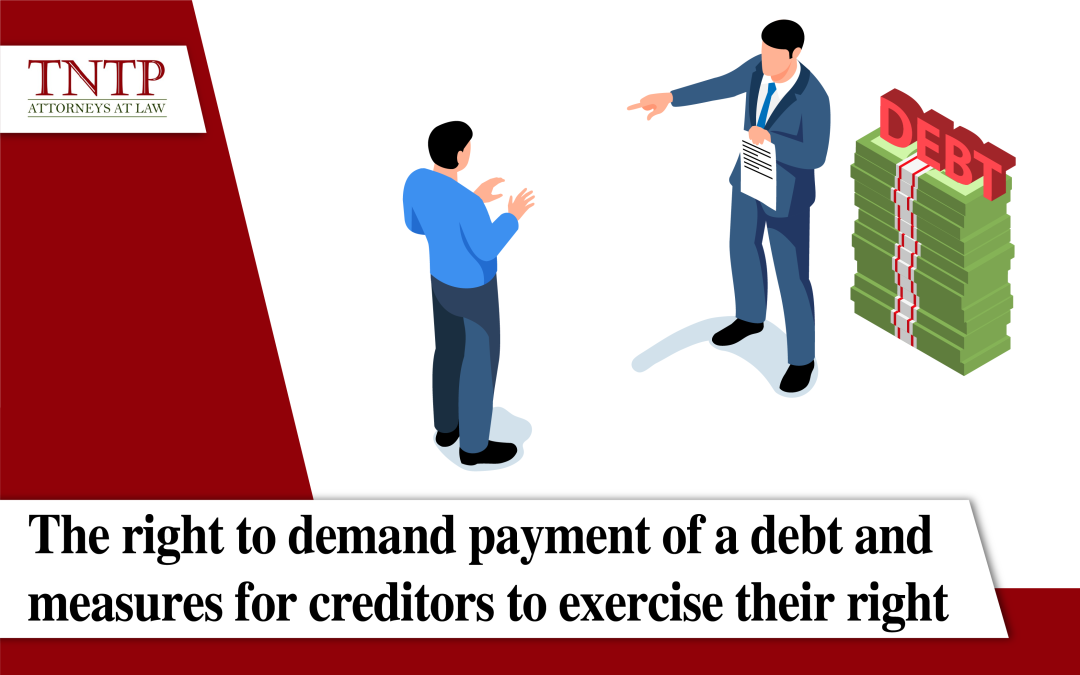In the context of performing civil transactions or contractual obligations, one party may incur a debt obligation toward another. When such debt becomes due, the creditor is legally entitled to request the debtor to fulfill the payment obligation. However, in practice, enforcing this right is often far from straightforward. Accordingly, this article by TNTP provides a legal analysis of the creditor’s right to demand repayment and the measures that may be employed to exercise such right effectively.
1. What is the right to demand payment?
Before delving into the right to demand payment of a debt, it is first necessary to clarify the concept of “debt”. A debt refers to a monetary obligation arising from civil transactions or contractual relations, whereby one party is required to pay or return a specified amount to another.
The right to demand debt repayment is a form of claim right within civil obligations. It refers to the lawful entitlement of the creditor to compel the debtor to discharge their monetary obligations based on an underlying contract or applicable legal provisions.
2. Measures for creditors to exercise their right to demand payment
In the process of debt collection, creditors may proactively implement the following measures to exercise their right:
2.1. Issuing Formal Reminders and Payment Notices
• Upon detecting a potential breach of the debt obligation, the creditor may send a formal written notice requesting payment, clearly stating the following: The outstanding amount; The debt payment period; and the legal consequences in the event of non-performance.
• In cases where the debtor faces financial difficulty yet demonstrates good faith, the creditor may consider debt rescheduling, interest rate concessions, or partial settlement plans. These actions may incentivize repayment and preserve the commercial relationship.
2.2. Selecting and Initiating Dispute Resolution Mechanisms
When a dispute arises during the debt collection process, the creditor may choose the following dispute resolution methods:
• Negotiation: The parties engage in direct dialogue – either through formal correspondence or in-person meetings to resolve the issue without third-party intervention.
• Mediation: A neutral third-party mediator facilitates dialogue and assists the parties in reaching a mutually acceptable resolution, emphasizing consensus rather than adjudication.
• Court or Arbitration: The creditor may file a claim before the competent People’s Court or an arbitral tribunal, seeking a decision compelling the debtor to fulfill their obligation. Upon the issuance of a final and binding judgment, decision, or arbitral award, if the debtor remains non-compliant, enforcement measures may be undertaken by state authorities in accordance with the law.
To settle a dispute through arbitration, there must be an existing arbitration agreement – either incorporated in the contract or established in writing before or after the dispute arises.
3. Factors affecting debt collection results
The debt collection process and its outcomes are influenced by various factors, including:
• Financial capacity and solvency of the debtors: If the debtors have no revenue, or assets, and are insolvent, the debt collection process may be prolonged and more difficult.
• Debtors’ attitude: If the debtors lack cooperation or goodwill, it becomes harder for the creditors to demand them to comply with the debt payment obligation.
• Capability of the debt collection agency: The capacity of the debt collection agency is also a factor affecting the outcomes of debt collection. A professional agency may assist creditors in quickly recovering their debts.
Additionally, legal policies and the consistent application of regulations by state agencies also play a role in determining the effectiveness of debt recovery.
4. Practical considerations for creditors exercising the right to demand repayment
• Documents proving debt obligations: Creditors need to retain all documents such as contracts, delivery records, invoices or official dispatches as a legal basis.
• Compliance with the law: Apply legal measures such as handling collateral, demanding the guarantor to perform the guarantee,… Simultaneously, creditors must not infringe upon the debtors’ life, health, honor, or dignity. Any coercive or unlawful behavior may expose the creditor to legal liability.
In conclusion, the right to demand repayment constitutes a fundamental legal entitlement arising in civil and commercial obligations. Nevertheless, exercising this right in practice requires a strategic, legally compliant, and often multidisciplinary approach. Creditors should carefully assess the circumstances, select appropriate enforcement mechanisms, and pursue recovery in a lawful and professional manner.
TNTP is pleased to present this legal overview in the hope that it provides valuable guidance to practitioners, creditors, and other interested stakeholders engaged in debt recovery activities.
Best regards,







